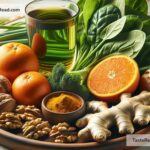Foods for Enhancing Lung Elasticity: A Guide to Keeping Your Lungs Healthy
Your lungs work hard every day to keep your body supplied with oxygen. Good lung health is essential for living an active and fulfilling life. One key aspect of lung health is lung elasticity, which refers to the ability of your lungs to expand and contract as you breathe in and out. When your lungs lose elasticity, it can lead to breathing difficulties and conditions such as chronic obstructive pulmonary disease (COPD).
Fortunately, eating a healthy diet can help improve lung elasticity and overall respiratory health. In this blog, we’ll explore some of the best foods for maintaining strong, flexible lungs.
The Connection Between Diet and Lung Health
Just like every other part of your body, your lungs rely on proper nutrition to function optimally. Certain foods contain antioxidants, vitamins, and nutrients that may reduce inflammation, repair lung tissues, and promote elasticity. By regularly including these foods in your meals, you can support lung health and even reduce the risk of developing serious respiratory issues.
Foods That Enhance Lung Elasticity
1. Leafy Greens
Leafy greens such as spinach, kale, and Swiss chard are packed with antioxidants and vitamins, especially vitamin C and beta-carotene. These nutrients help reduce inflammation in the lungs, making it easier for them to function. Vitamin C also assists in repairing damaged lung tissues and may improve elasticity over time.
How to include them: Add leafy greens to salads, smoothies, or stir-fries for a delicious boost in nutrition.
2. Berries
Berries like blueberries, strawberries, and raspberries are rich in antioxidants such as anthocyanins and vitamin C. These antioxidants help fight free radicals that can damage lung cells and impair elasticity. Eating berries regularly can protect your lungs and improve their ability to expand and contract effectively.
How to include them: Enjoy berries as a snack, sprinkle them on your oatmeal, or blend them into smoothies.
3. Citrus Fruits
Oranges, lemons, grapefruits, and other citrus fruits are loaded with vitamin C. This nutrient has strong anti-inflammatory properties that promote better lung function. Vitamin C also supports the production of collagen, an essential protein that helps maintain the structure and elasticity of lung tissue.
How to include them: Drink fresh citrus juice, eat the fruits whole, or use them to add flavor to your dishes.
4. Fatty Fish
Fatty fish like salmon, mackerel, and sardines are high in omega-3 fatty acids, which are known for their anti-inflammatory properties. Omega-3s can help reduce inflammation in the lungs, improve lung capacity, and support elasticity by maintaining healthy cell membranes in lung tissue.
How to include them: Grill or bake fatty fish as part of your meal or enjoy it as sushi for a fun treat.
5. Nuts and Seeds
Nuts and seeds, including almonds, walnuts, chia seeds, and flaxseeds, are excellent sources of vitamin E and omega-3 fatty acids. Vitamin E is particularly beneficial for protecting and repairing lung tissues, while omega-3s alleviate inflammation and improve respiratory function. Eating nuts and seeds regularly can contribute significantly to lung elasticity.
How to include them: Snack on a handful of nuts, sprinkle seeds on yogurt or oatmeal, or use them as toppings for salads.
6. Garlic
Garlic is a powerhouse when it comes to lung health. It contains allicin, a compound with strong anti-inflammatory and antibacterial properties. These qualities can help keep the lungs clear and improve their elasticity by reducing inflammation in the airways. Garlic may also protect against respiratory infections.
How to include it: Use garlic as a flavor enhancer in soups, stir-fries, or roasted vegetables.
7. Turmeric
Turmeric contains curcumin, a compound with powerful anti-inflammatory and antioxidant properties. Curcumin has been shown to benefit the lungs by reducing inflammation in the airways and supporting tissue repair. Adding turmeric to your diet can help keep your lungs elastic and functioning well.
How to include it: Sprinkle turmeric on roasted vegetables, add it to soups and stews, or mix it into tea for a soothing drink.
8. Cruciferous Vegetables
Vegetables like broccoli, cauliflower, and Brussels sprouts are full of antioxidants that can protect lung tissues and promote lung function. These veggies are also high in fiber, which aids in reducing inflammation throughout the body, including the lungs.
How to include them: Steam or roast these vegetables for a simple and nutritious side dish.
9. Apples
Apples are rich in quercetin, a type of antioxidant that may help reduce damage to lung tissues caused by pollution and smoking. Regular consumption of apples is associated with better lung function and reduced risk of lung diseases.
How to include them: Eat apples as a snack, slice them into salads, or bake them for a warm and healthy dessert.
10. Water
While technically not a food, staying hydrated is crucial for lung health. Drinking enough water helps keep the mucus in your lungs thin, making it easier for your lungs to expand and contract smoothly. Proper hydration also supports overall lung elasticity.
How to include it: Make it a habit to drink water throughout the day, and consider herbal teas or infused water for variety.
Final Thoughts
Your lungs are vital organs, and taking care of them should be a priority. By eating foods that support lung elasticity, you can improve your breathing, reduce inflammation, and protect your lungs from environmental damage over time. Combine a healthy diet with regular exercise and avoid smoking or exposure to pollutants to give your lungs the care they deserve.
By making small changes in your food choices today, you can breathe easier and enjoy better lung health tomorrow!


